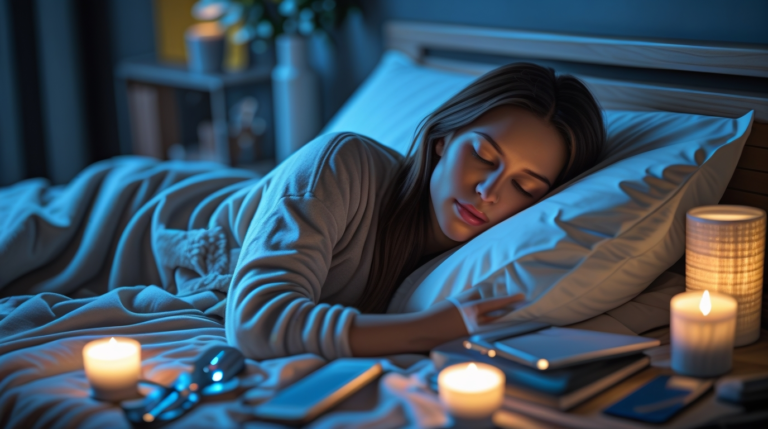In today’s fast-paced world, finding the best night routine ideas that help you sleep faster is crucial for health and productivity. Quality sleep enhances our mental and physical well-being, impacting everything from memory retention to our emotional resilience. In this blog post, we explore effective strategies and tips to refine your night routine, ensuring you drift off into a peaceful sleep sooner and wake up refreshed the next day.
Create a Relaxing Sleep Environment
Your sleep environment plays a pivotal role in achieving faster and deeper sleep. A conducive atmosphere can encourage your body to relax, signaling it’s time to rest.
Set the Right Temperature
Maintaining a comfortable room temperature is key to a good night’s sleep. Research suggests that a cooler room, ideally around 60-67°F, facilitates the body’s natural drop in temperature, which promotes sleep. Adjust your thermostat or use fans and heaters to find your optimal sleeping temperature.
Optimize Lighting
Exposure to bright light, especially blue light from screens, can hinder melatonin production, a hormone crucial for sleep. Dimming lights an hour before bed and using blackout curtains can help create a softer environment that encourages sleep. Consider using a warm-colored night light or a sleep mask to block out additional light sources.
Establish a Calming Pre-Sleep Ritual
A consistent pre-sleep ritual can signal your brain that it’s time to wind down. Incorporate habits that promote relaxation and prepare you for sleep.
Wind Down with Mindful Activities
Activities such as reading a book, listening to soothing music, or practicing mindfulness exercises like meditation can calm your mind. Engaging in mindful breathing can reduce stress and anxiety, making it easier to fall asleep. Consider incorporating a brief meditation session to clear your mind at the end of a busy day.
Avoid Stimulating Activities
Avoid engaging in activities that could raise your adrenaline levels before bed. This includes limiting screen time, refraining from intense exercises at night, and steering clear of stressful conversations or work emails that can trigger anxiety. These adjustments will help your body recognize bedtime as a period for relaxation.
Mind Your Pre-Bedtime Diet
What you consume before bed can significantly impact the quality of your sleep. Opt for sleep-promoting foods while avoiding stimulants.
Choose Sleep-Enhancing Snacks
Light snacks like a banana, almonds, or a glass of warm milk can promote sleep. These snacks contain nutrients that aid in the production of melatonin and serotonin. Avoid heavy or spicy meals late in the evening that could disrupt digestion.
Avoid Caffeine and Alcohol
Caffeine can stay in your system for several hours, making it hard for you to fall asleep. Limit your coffee intake to the morning hours and be mindful of caffeinated teas and chocolates. Similarly, while alcohol might initially make you drowsy, it can disrupt your sleep cycle and reduce sleep quality.
Stay Consistent with Your Sleep Schedule
Consistency in your sleep schedule reinforces your circadian rhythm, making it easier to fall asleep and wake up naturally. Aim to go to bed and wake up at the same time every day, even on weekends.
Maintain a Regular Sleep-Wake Cycle
Your body’s internal clock, or circadian rhythm, works best when it’s aligned with a consistent sleep schedule. Try to set consistent bedtime and waking hours, including on weekends, to improve sleep quality.
Use a Bedtime Reminder
Consider setting an alarm to remind you when it’s time to wind down for the night. This can be particularly helpful in establishing and maintaining your sleep schedule. Over time, this routine reinforces the body’s natural signals for sleepiness.
Incorporate Relaxation Techniques
Adding relaxation techniques to your night routine can ease your transition from wakefulness to sleep, reducing stress and anxiety.
Practice Deep Breathing and Meditation
Deep breathing techniques, such as 4-7-8 breathing, can relax your nervous system. Meditation, particularly focused on letting go of the day’s worries, promotes mental peace and prepares your body for rest.
Engage in Progressive Muscle Relaxation
This technique involves tensing and then relaxing different muscle groups to reduce physical tension and calm your mind. Start from your toes and work your way up to the head, ensuring you release all tension from each muscle group.
Conclusion and Call-to-Action
Implementing a tailored night routine that aligns with your lifestyle can significantly enhance your sleep quality and speed up the time it takes for you to drift off. By optimizing your sleep environment, establishing relaxing pre-sleep rituals, and maintaining a consistent schedule, you can transform your nights into rejuvenating experiences. For more insights on improving your sleep, check out our post on how to design a perfect morning routine and explore tips for managing sleep disorders.
What night routine ideas help you sleep faster? Share your tips in the comments below! Don’t forget to subscribe to our blog for more articles on improving your sleep and overall well-being, and share this post with friends who might benefit from these tips!


Leave a Comment